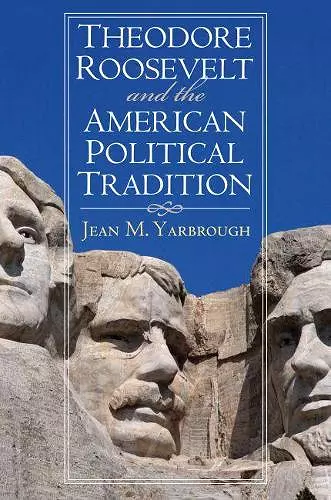Theodore Roosevelt and the American Political Tradition
Format:Paperback
Publisher:University Press of Kansas
Published:31st Jan '14
Currently unavailable, and unfortunately no date known when it will be back

Rough Rider, hunter, trust-buster, president and Bull Moose candidate. Biographers have long fastened on TR as man of action, while largely ignoring his political thought. Now, in time for the centennial of his Progressive run for the presidency, Jean Yarbrough provides a searching examination of TR’s political thought, especially in relation to the ideas of Washington, Hamilton and Lincoln - the statesmen TR claimed most to admire.
Yarbrough sets out not only to explore Roosevelt’s vision for America but also to consider what his political ideas have meant for republican self-government. She praises TR for his fighting spirit, his love of country and efforts to promote republican greatness, but faults him for departing from the political principles of the more nationalistic Founders he esteemed. With the benefit of hindsight, she argues that the progressive policies he came to embrace have over time undermined the very qualities Roosevelt regarded as essential to civic life. In particular, the social welfare policies he championed have eroded industry and self-reliance; the expansion of the regulatory state has multiplied the special interests seeking access to political power; and the bureaucratic experts in whom he reposed such confidence have all too often turned out to be neither disinterested nor effective.
Yarbrough argues that TR’s early historical studies - inspired by Darwinian biology and Hegelian political thought - treated westward expansion from an evolutionary and developmental perspective that placed race and conquest at the centre of the narrative, while relegating individual rights and consent of the governed to the sidelines.
Although his early career showed him to be a moderate Republican reformer, Yarbrough argues that even then he did not share Hamilton’s enthusiasm for the commercial republic and substituted an appeal to “abstract duty” for The Federalist’s reliance on self-interest. As New York governor and first-term president, TR attempted to strike a “just balance” between democratic and oligarchic interests, but by the end of his presidency he had tipped the balance in favour of progressive policies. From the New Nationalism until his death in 1919, Roosevelt continued to claim the mantle of Washington and Lincoln, even as he moved further from their political principles.
Through careful examination of TR’s political thought, Yarbrough’s book sheds new light on his...
“Many books have been written about Theodore Roosevelt the man, but Yarbrough admirably captures Roosevelt the thinker. The true value of Yarbrough’s book, however, is not its exegesis of Roosevelt, sound as that is, but in its compelling representation of Roosevelt as an avatar of profound shifts in American political thinking. The main elements of this shift are the replacement of the mechanisms of constitutional politics with the organicism of German state theory; the shift to presidential politics as the embodiment of the new nationalism; the alterations of the Framers’ ideas of human nature and liberty; and the problematic resolution of the tensions between liberty and equality in the idea of fraternity. Yarbrough adroitly contrasts Roosevelt’s emergent Progressivism with the traditional ideas found in the Declaration of Independence, demonstrating how the Progressive movement reconstituted US politics. Her sense of Roosevelt’s place in the American political tradition is sure. Yarbrough gives a full accounting of the race-based and scientistic (Darwinian) assumptions that undergirded Roosevelt’s aspirations toward national greatness and large-scale communitarian politics. The book is written in an accessible, clear style. Summing up: Highly recommended. All readership levels.” - Choice
ISBN: 9780700619689
Dimensions: 228mm x 152mm x 20mm
Weight: 456g
256 pages